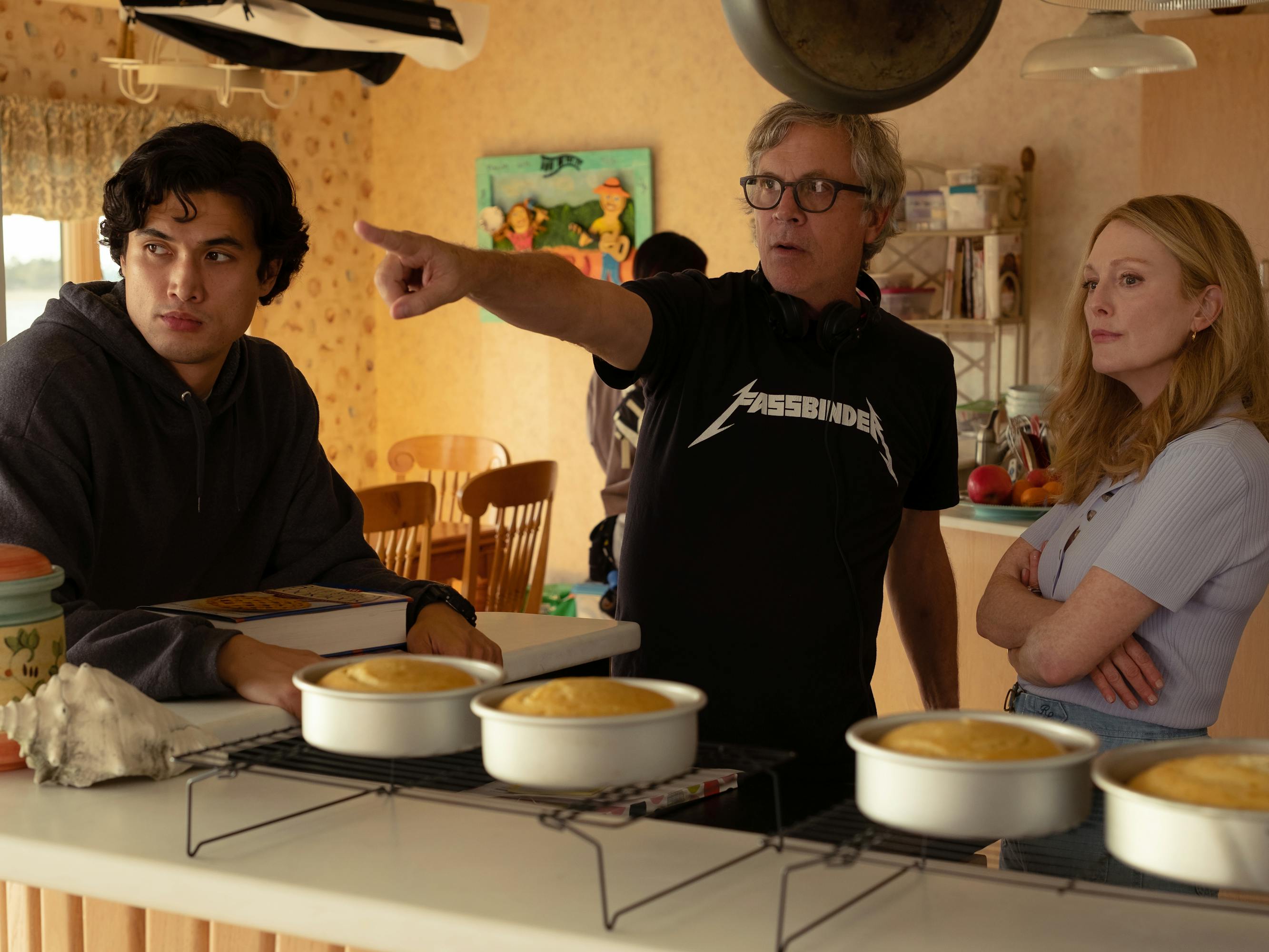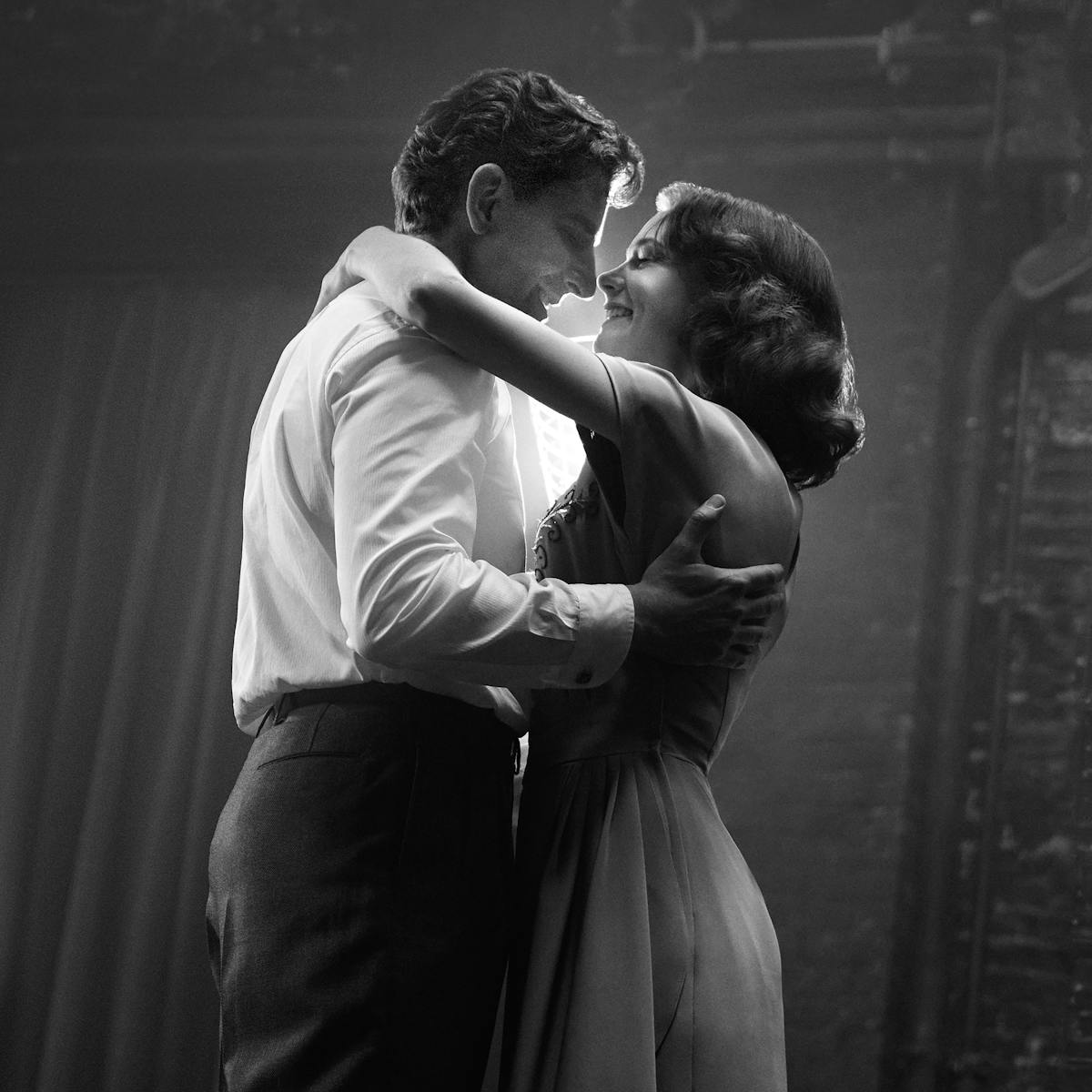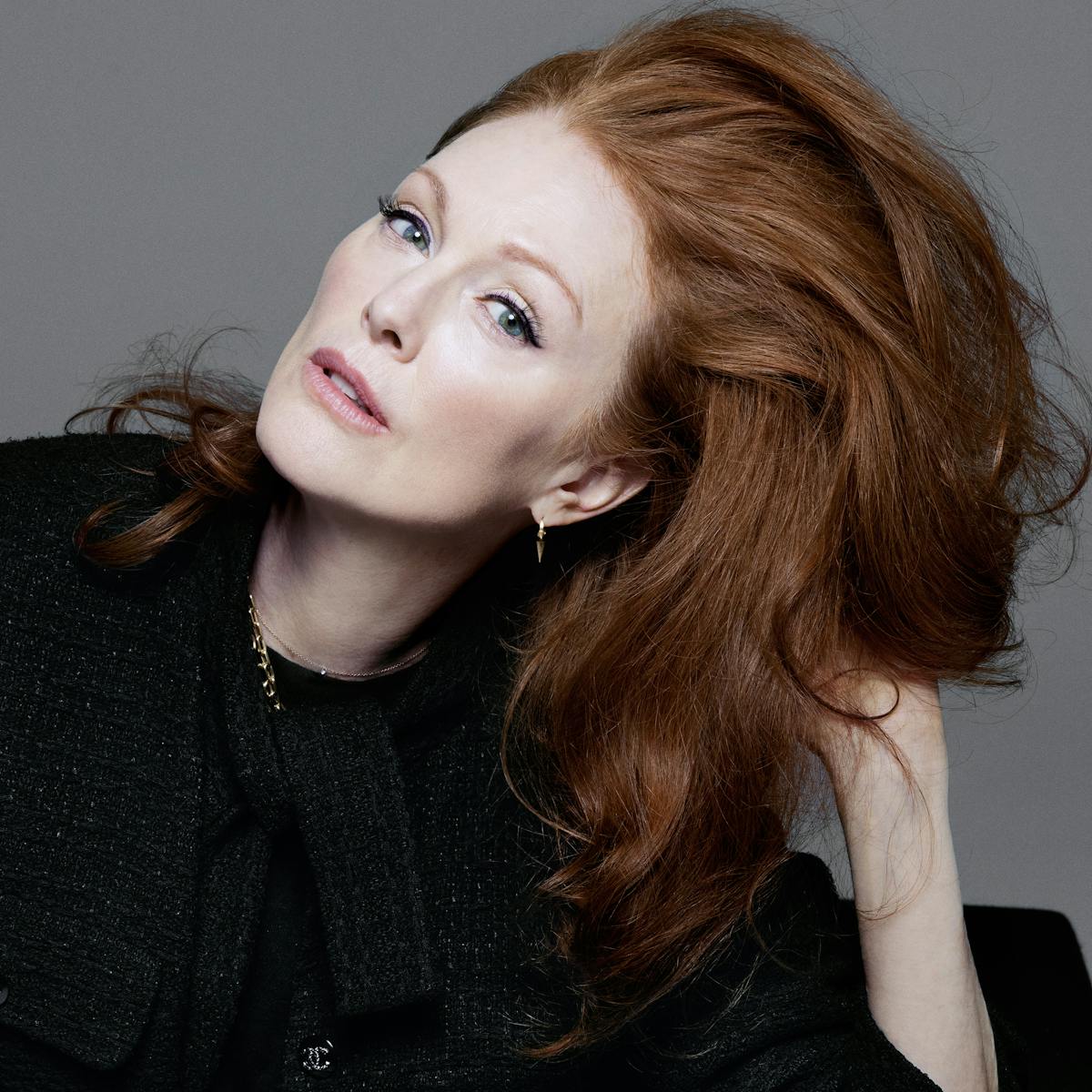In so many ways, May December has all the hallmarks of a classic Todd Haynes film: a beautiful if potentially disconcerted heroine at the center of the action, with a rippling current of tension underneath the glossy surface of her pristine suburban existence. Julianne Moore — who has portrayed some version of that archetype in two of Haynes’s most beloved and fascinating films, Safe and Far from Heaven — plays Gracie, a woman living with some of the trappings of what looks, from a telescopic distance, like the American dream. In truth, she’s long been mired in trauma, tabloid scandal, and treachery: She is married to and has teenage children with Joe, played subtly and beautifully by Charles Melton, who she first became involved with when she was an adult and he was just 13. Natalie Portman is riveting as Elizabeth, an actress tasked with playing Gracie in a biopic, who hopes to study her up close to get to the disquieting core of the drama but ends up revealing many of her own toxic traits in the process.
“Once upon a time . . . ” this is not. If the women at the heart of Haynes’s other films, like Carol and Far from Heaven, have often been troubled or stuck, they’ve also been more than worthy of sympathy and grace. Here, in May December, something else is going on, a kind of brilliant trick of the mind where our instinct for identifying with Haynes’s protagonists ends up, if we’re not careful, actually implicating us in their guilt and guile. These are women made not necessarily to be loved, and maybe not even fully understood; instead, they are strange bellwethers for the knotty politics of sex and power, in which our assumptions about men and women’s roles in relationship dynamics are challenged and complicated. We leave the film unsure of what to make of the people we just spent two hours with. “In today’s culture, we are handed characters who you know are good or bad, and you sort of enjoy knowing who and what they are. In this film, you come with a lot of easy-to-apply moral judgments around the content,” Haynes says. “But the manner in which the May December script was written — and what we hoped to do in the film — means that those certainties start to shift beneath your feet in very nuanced and subtle ways. You’re really put into a position of having to think and interpret as you watch.”

Charles Melton, Todd Haynes, and Julianne Moore
Photograph by François Duhamel
I’ve always been interested in telling stories of people who are struggling under limitations of freedom because I think that binds all of us, at our most vulnerable places, to each other.
Haynes has long been seen as a queer director who foregrounds sexuality and gender in his work. But May December, which hinges on straighter power dynamics, reminds us that for Haynes, queer themes are more than just the homosexual-heterosexual binary. He asks us to consider the muddiness of identity itself, whether through the David Bowie-esque gender-bending of Velvet Goldmine, or I’m Not There, his unusual biopic of Bob Dylan in which the singer is played by six different actors (including Cate Blanchett), to represent the converging facets of his personality. “There are films where homosexuality is struggling to come into its own sight: the character of [Moore’s character’s husband] Frank in Far from Heaven for instance. Carol is really about two women who discover that they really are oriented around a desire for other women,” he says. “But I like to pose questions about sexual identity around questions of identity itself — the ways we hunker down and adhere to the limitations of how we’re supposed to think of ourselves as sexual, gendered, racial identities — to keep finding the places where that sort of seeps out of a stable social language.”
Haynes does have a preoccupation with suburban life, and focuses many of his films against the most manicured of upper-middle-class backdrops, whether it’s the stifling commuter colonies of the 1950s in Carol and Far from Heaven or the picturesque sweetness of a Georgia town in May December. He credits this to his upbringing in suburban California. Haynes grew up near Los Angeles in Encino, and loved film from a young age, producing some of his earliest work when he was just in high school. As a student at Brown University, he directed his first real short film inspired by French poet Arthur Rimbaud, before moving to New York City and falling in with the city’s independent movie scene. But spiritually, he’s never fully left the suburbs behind, constantly mining its potential for plot and theme. “A lot of artists who come from the suburbs have a yearning to leave, challenge, destroy them. But what you also learn is the limitations of the world in which you were raised create a microcosm for the struggles that everybody feels, no matter where they come from. It’s just a more concentrated setting we’ve made symbolic of repression,” he says. “On the one hand, desire gets stirred up in places where things don’t seem free. But you don’t lose sight of the restraints. It’s all right there.”
Haynes has also centered the story of fraught women in almost all of his films. His unlikely 1987 art house hit Superstar: The Karen Carpenter Story, made while still an M.F.A. student at Bard College, told the devastating tale of the Carpenters singer’s battle with anorexia. Every role is played not by a person but by a Barbie doll, that enduring artifact of American girlhood. Again, he sees in women’s complicated position a chance to explore all kinds of bumpy, complex motifs. “Women end up having to both stand inside and outside social norms, to carry the burden of social institutions, more than men do. That gives them so much potential as subjects in movies. I’ve always been interested in telling stories of people who are struggling under limitations of freedom because I think that binds all of us, at our most vulnerable places, to each other,” he says. “Women’s lives are on such a knife’s edge around so many of these issues.”
If there is a film of Haynes’s that May December harkens back to most, it’s 1995’s haunting Safe, which also stars Moore. In that movie, she plays a wealthy housewife who falls sick with a mysterious illness, eventually said to be caused by the chemicals in everyday household products. She becomes increasingly cut off from her friends and family. The film was interpreted as a parable for the AIDS crisis, but because of its spotlight on disease and isolation, it’s experienced a resurgence of relevance with the advent of COVID. It also shares with May December an atmosphere of unnerving terror — even violence — that creeps around the edges. “While there are horror elements, you’re questioning how much the characters understand about the choices that they’ve made and the impacts that they have,” he says of parallels between the films. “But [May December’s] Gracie really is such a very unique character. There’s such determination to pursue her needs and force men to comply. A lot of this gets disguised — Gracie’s little girl characteristics, the lisp. But there’s a lot of labor involved. And that’s not always the case in the female characters I’ve explored, who are more the subject of choices that they really aren’t entitled to make for themselves.”

Todd Haynes
In one specific way, May December echoes Far from Heaven: its subtle, murky exploration of the sensitive male ego. In Far from Heaven, it was a closeted gay husband played with incredible tension by Dennis Quaid, as well as a Black gardener, rendered poetically by Dennis Haysbert, who falls in love across color lines but struggles with how to handle that love in a racist world. Here, Melton, an actor best known for a role on the TV show Riverdale, plays Joe, Gracie’s partner who was in seventh grade when they began a relationship. At first, Joe seems relatively straightforward and almost well-adjusted considering the circumstances, but as the plot unfolds, Melton masterfully hints at the trauma and toxicity underneath the surface of Joe’s psyche. It’s such a profound, quiet performance — potentially star-making for Melton — and a reminder that Haynes is a true actor’s director, pulling some incredible work out of his cast members and even scoring acting nominations at the Oscars for Blanchett and Moore over the years.
Haynes has been able to follow these instincts — to home in on the issues that most interest him while not overtly bending to the wills and whims of the film industry — and remain a successful indie auteur for around 30 years. It’s a true achievement that he’s crafted movies that touch the mainstream without dumbing down the ideas or idiosyncrasies, and there aren’t many directors who’ve had a career quite like this. May December is just the latest culmination of decades spent building a visual and thematic language of his own, of respecting audiences enough to believe they’ll be able to grapple with a thorny, challenging piece of art that doesn’t have easy answers. Just this year, Haynes was honored with a retrospective at Centre Pompidou for his unique contribution to film. “A pinch myself moment because, for the most part, we all are just struggling to get the next thing done,” he says. “I was surrounded by so many of my colleagues and creative partners and actors. Just like, Wow, I really have been able to do all of this with all of these people and all of this help and all of this love. I count my blessings, man.”
All content featured in this issue was captured in accordance with guild guidelines.









